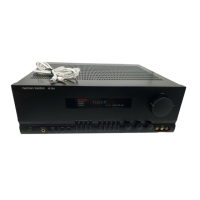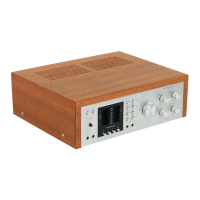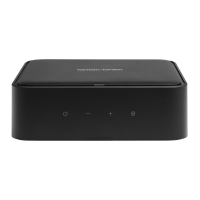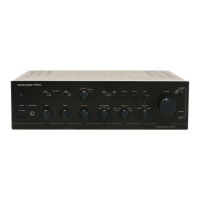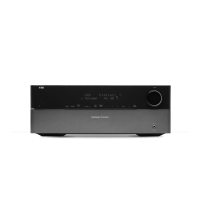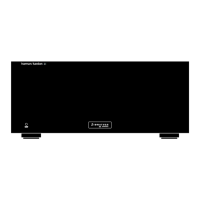Do you have a question about the Harman Kardon AVI 250 and is the answer not in the manual?
Describes the main display panel and its indicators for status and messages.
Explains the function of all buttons, knobs, and jacks on the front panel for operation.
Details all audio input/output and system control jacks on the rear panel.
Details all video input/output jacks on the rear panel for sources.
Congratulates the user and provides a general description of the amplifier's capabilities.
Lists the main capabilities, technologies, and design philosophies of the unit.
Covers voltage compatibility, cord safety, cabinet access, and placement precautions.
Guidelines for proper placement, ventilation, and cleaning of the unit.
Procedures for safely moving the unit and important plug safety information.
Advice on saving, flattening, or disposing of packaging materials.
Detailed advice on placing the unit for optimal operation and safety.
Explains the symbols and formatting used in the manual for clarity.
Explains the meaning of various indicators and messages on the front panel display.
Covers power, source selection, volume, mute, and transport controls.
Details tune/search, channel/skip, disc/deck, and copy functions.
Covers numeric keys, p-scan, memo, delay, menu, select, display, test, speaker, and level adjust.
Covers LEDs and the 6 Channel Direct button functions.
Guides for connecting various audio/video sources and outputs to the rear panel.
Advice on speaker cable quality, gauge, and installation.
Importance of correct polarity and initial speaker placement for sound quality.
Details power connections and system setup requirements.
How to use an external IR sensor if the unit is obstructed.
Connecting to external amplifiers via PRE OUT jacks.
How to connect speakers when using external amplifiers for front channels.
Details accessory AC outlets and the main power connection.
Instructions for replacing remote control batteries.
Describes the operating range and aiming requirements for the remote.
Explains which keys on the remote control can be programmed.
Details keys that can be programmed with single or multiple codes.
Step-by-step guide to learning new remote control codes.
Instructions for clearing individual keys or the entire remote's programmed memory.
Guidance on choosing and positioning speakers for optimal sound.
Illustrations showing recommended speaker placement for different setups.
Specifics on placing surround speakers relative to the listening position.
Advice on positioning the subwoofer for optimal bass response.
Steps to start system configuration using on-screen menus.
How to set the center channel mode (Large, Small, None).
Option to enable or disable the subwoofer.
Configuring volume control for multiroom operation.
Locking configuration settings and adjusting volume levels.
How to lock or unlock configuration settings to prevent changes.
Using test tone to balance speaker levels for optimal output.
Step-by-step guide for adjusting speaker volume using test signals.
How to turn the unit on and choose input sources for listening.
Adjusting volume and selecting surround sound modes.
Different ways to select surround modes via front panel or remote.
Feature that automatically turns the system on with a TV signal.
How status screens, messages, and indicators appear on the TV.
Describes temporary messages shown for functions like mode changes.
Covers displays for input selection, tape copy, volume, and mute.
Explains controlling the unit via on-screen menus for system settings.
Details for navigating the input selection menu.
Details menus for record out selection and surround mode adjustments.
How to perform audio, video, and simulcast recordings.
Steps for creating a simulcast recording with separate audio/video sources.
Customizing surround sound delay settings for optimal acoustics.
Using digital inputs to avoid analog conversion for improved sound.
Connecting LD players with coaxial digital output for direct decoding.
Connecting external multichannel audio decoders for discrete surround sound.
Detailed comparison of surround modes, features, and delay time ranges.
Connecting IR sensors and audio links for remote rooms.
Important notes on cable routing, safety, and interference prevention.
Steps for configuring multiroom settings via the main unit.
Selecting the input source for the multi room system.
Setting volume control options (Variable/Fixed) for remote rooms.
How to turn on the remote room feed using the MULTI button.
Controlling multiroom zones from main or remote locations.
A chart of symptoms, causes, and solutions for common operational problems.
Explanation of the system configuration memory backup and its limitations.
Detailed electrical and performance specifications for audio and video sections.
Covers power requirements, dimensions, weight, and other general details.
| Type | Integrated Amplifier |
|---|---|
| Frequency response | 1Hz to 100kHz |
| Total harmonic distortion | 0.09% |
| Input sensitivity | 0.12mV (MC), 2.5mV (MM), 150mV (line) |
| Dimensions | 443 x 103 x 361mm |
| Weight | 7.7kg |
| Power output | 50W per channel into 8Ω |
| Input Impedance | 47kΩ (line) |

